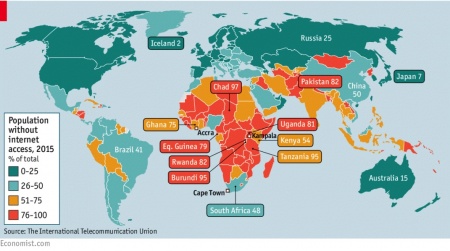Difference between revisions of "Template:DigI About"
Josef.Noll (Talk | contribs) |
Josef.Noll (Talk | contribs) |
||
| Line 1: | Line 1: | ||
| − | The '''Non-discriminating access for Digital Inclusion''' (DigI) project is a three year project, running from 2017 - 2020 with the main objective to establish pilots for the [[InfoInternet]] access in [[DigI:DRC|DRC Congo]] and [[DigI:Tanzania|Tanzania]]. The project was founded by the Research Council of Norway as part of the Visjon2030 portfolje<ref> Norwegian Research Council, "57 millioner til innovasjon for fattigdomsbekjempelse", ''online: http://www.forskningsradet.no/no/Nyheter/57_millioner_til_innovasjon_for_fattigdomsbekjempelse/1254022844465/p1174467583739'', 16Dec2016</ref>. | + | <!---- {| id="cwi_news" style="width:{{{1|274px}}}" ---> |
| + | The '''Non-discriminating access for Digital Inclusion''' (DigI) project is a three year project, running from 2017 - 2020 with the main objective to establish pilots for the [[InfoInternet]] access in [[DigI:DRC|DRC Congo]] and [[DigI:Tanzania|Tanzania]]. The project was founded by the Research Council of Norway as part of the Visjon2030 portfolje<ref> Norwegian Research Council, "57 millioner til innovasjon for fattigdomsbekjempelse", ''online: [http://www.forskningsradet.no/no/Nyheter/57_millioner_til_innovasjon_for_fattigdomsbekjempelse/1254022844465/p1174467583739 Forskningsradet.no Visjon 2030 Nyheter]'', 16Dec2016</ref>. | ||
R&I work related to the pilots will prove business profitability for commercial establishment of the [[InfoInternet]] as an independent and self-sustainable ICT and communication infrastructure for digital inclusion. Internet access is a universal issue and of major concern to many policy makers and governments. Free access to information presents the basis for a scalable solution of digital access for everyone in the society. | R&I work related to the pilots will prove business profitability for commercial establishment of the [[InfoInternet]] as an independent and self-sustainable ICT and communication infrastructure for digital inclusion. Internet access is a universal issue and of major concern to many policy makers and governments. Free access to information presents the basis for a scalable solution of digital access for everyone in the society. | ||
| − | Digital access to information, [[CTU:Home|connecting the unconnected]], is the entry point for digital skills, and addresses to be addressed in the sub- objectives related to digital health, education for youth and women, as driver for digital education ''(see figure on Population without Internet<ref name="Economist 2016"> "Continental disconnect - Mobile phones are transforming Africa", The Economist, 18Dec2016, http://www.economist.com/news/middle-east-and-africa/21711511-mobile-phones-are-transforming-africa-where-they-can-get-signal-mobile-phones</ref>)''. | + | Digital access to information, [[CTU:Home|connecting the unconnected]], is the entry point for digital skills, and addresses to be addressed in the sub- objectives related to digital health, education for youth and women, as driver for digital education ''(see figure on Population without Internet<ref name="Economist 2016"> "Continental disconnect - Mobile phones are transforming Africa", The Economist, 18Dec2016, [http://www.economist.com/news/middle-east-and-africa/21711511-mobile-phones-are-transforming-africa-where-they-can-get-signal-mobile-phones Economist.com Mobile Phones Transforming Africa]</ref>)''. |
[[File:Economist_Africa_Coverage.jpg|450px|Source:The Economist Continental disconnect - Mobile phones are transforming Africa]] | [[File:Economist_Africa_Coverage.jpg|450px|Source:The Economist Continental disconnect - Mobile phones are transforming Africa]] | ||
Revision as of 19:16, 14 January 2017
The Non-discriminating access for Digital Inclusion (DigI) project is a three year project, running from 2017 - 2020 with the main objective to establish pilots for the InfoInternet access in DRC Congo and Tanzania. The project was founded by the Research Council of Norway as part of the Visjon2030 portfolje[1]. R&I work related to the pilots will prove business profitability for commercial establishment of the InfoInternet as an independent and self-sustainable ICT and communication infrastructure for digital inclusion. Internet access is a universal issue and of major concern to many policy makers and governments. Free access to information presents the basis for a scalable solution of digital access for everyone in the society.
Digital access to information, connecting the unconnected, is the entry point for digital skills, and addresses to be addressed in the sub- objectives related to digital health, education for youth and women, as driver for digital education (see figure on Population without Internet[2]).
The main objective of providing non-discriminating access is supported through deployments and validation in Tanzania and DRC (Congo), focussing on the following sub-objectives:
- Bridging the digital divide by providing the InfoInternet infrastructure and digital access.
- Provision of customised content for education and health purposes, thus creating the basis for jobs, as well as financial and social inclusion
- A cost-effective, open and scalable Wifi extension of the mobile network for the low-income group, enabling (mobile) operators to provide digital services
- Education, health and entrepreneurship for women and youth empowerment as representatives of the vulnerable society groups
Read more? Please have a look at the project details, our overall plans DRC Congo and Tanzania or the solutions using InfoInternet access...
References
- ↑ Norwegian Research Council, "57 millioner til innovasjon for fattigdomsbekjempelse", online: Forskningsradet.no Visjon 2030 Nyheter, 16Dec2016
- ↑ "Continental disconnect - Mobile phones are transforming Africa", The Economist, 18Dec2016, Economist.com Mobile Phones Transforming Africa
